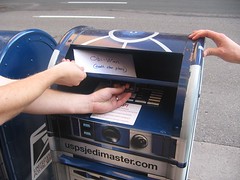The hope for the $75 million was to increase fervor for democracy and to support civil groups working on such issues:
- $36 million for radio and television beamed into Iran
- $10 million for public diplomacy and exchange programs
- $20 million for civil society groups such as NGOs and legal and human rights organizations
For the Iranian government, the democracy fund is just one more element in an elaborate Bush administration regime-change stratagem. (“Is there even a perception that the American government has democracy in mind?” Iran’s ambassador to the United Nations, Javad Zarif, asked me recently in New York. “Except among a few dreamers in Eastern Europe?”) In recent months, Tehran has upped the pressure on any citizens who might conceivably be linked to the democracy fund and, by extension, on civil society at large, making the mere prospect of American support counterproductive, even reckless...The suspicion isn't entirely unfounded. The democracy fund has a legacy of American meddling in Iran to overcome:
It is particularly telling, perhaps, that some of the most outspoken critics of the Iranian government have been among the most outspoken critics of the democracy fund. Activists from the journalist Emadeddin Baghi to the Nobel laureate Shirin Ebadi to the former political prisoner Akbar Ganji have all said thanks but no thanks.
As Martin Indyk, an assistant secretary of state for Near East Affairs during the Clinton administration, recently told me: “Don’t forget 1996, when Newt Gingrich proposed an $18 million program, a covert program to overthrow the regime. From then the Iranians were convinced we were coming for them.”But there's also evidence that the Bush administration has an agenda that's more than promoting American values of democracy and rule of law. Almost half the fund's money was meant to support radio and television broadcasting into Iran, something that had been successfully modeled for years.
But the democracy fund money to boost V.O.A. was not without strings attached.Every day at 8 p.m., hundreds of thousands of Iranians around the country tune into the Voice of America’s Persian service on their satellite televisions...Founded in 1996, the television service is based upon the V.O.A. template designed during World War II to target restive populations under Nazi occupation. It is perhaps best known for its work in broadcasting beyond the Iron Curtain during the cold war. By and large, V.O.A. Persian has earned a reputation as a balanced source of news, especially compared with an Iranian state television that has grown increasingly doctrinaire...The fundamental assumption of Voice of America is that the societies to which it is broadcasting are not free and that the best thing you can do to advance their freedom is to show them what fair reporting is like and, along the way, show them the good news about American values.
[With help from the democracy fund,] V.O.A.’s Persian television programming spiked from one to five hours a day.
In other words, the Bush administration's efforts are fouling what has been a long-standing practice of promoting values without promoting regime change. Instead, with the waters muddied, many of the activists who in the past appreciated American aid are now suspicious of it, as is their government.The dedicated funds for Persian-language media increasingly look to many inside the V.O.A. like an opportunity lost, particularly as the money arrived with a bundle of expectations attached. “There was this idea that we had to serve the White House with this money,” one V.O.A. staff member recently told me. “And then there was Archin’s report.” Ladan Archin, a former student of Paul Wolfowitz’s currently serving in the Defense Department, had been asked to write an internal report on Persian-language programming for the N.S.C. and the now-dissolved Iran Steering Group in 2006. Her report, leaked in September 2006, was pithy and damning: she deemed the programming a waste of money. Archin chronicled instances of what she considered the V.O.A.’s giving a platform to “the Islamic Republic’s version of issues” and listed commentators who had gone on air criticizing American policy. Her report was echoed by Senator Tom Coburn, Republican of Oklahoma, who has consistently pressed V.O.A. to be harder on the Islamic Republic...
The charged climate may have given free rein to a disturbing variety of political actors. On occasion, V.O.A. has lurched toward Reza Pahlavi, the shah’s son. The 40-something would-be monarch, who lives in Maryland, is often on the program and on occasion is invited to bestow New Year’s wishes on the Iranian people. And on April 1 of this year V.O.A. featured Abdolmalek Rigi, the head of Jondollah, a militant Sunni group that operates inside Iran’s southeastern border and claims to advance the interests of the Baluch minority. Jondollah is responsible for dozens of hostage takings and terrorist attacks. On this particular round-table program, Rigi was introduced as the leader of an armed national resistance group...The new administrators at V.O.A. “do not seem to be able to distinguish between journalism and propaganda,” Khalaji told me. “If you host the head of Jondollah and call him a freedom fighter or present a Voice of America run by monarchists, Iranians are going to stop listening.”
We might have more luck promoting democracy and rule of law if our president was a better model...








